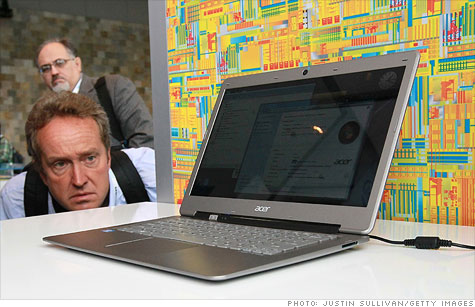Search News

This Acer Ultrabook was on display at Intel's 2011 Intel Developer Forum in September.
NEW YORK (CNNMoney) -- As the iPad eats away at personal computer sales, the PC appears to have found a potential savior in ... Apple?
It's an unlikely source, but it's true. Ultrabooks, the ultra-thin notebook computers with no hard disk drive or slot for a DVD, are a category of PC that was essentially invented by Apple (AAPL, Fortune 500) with its MacBook Air, which debuted in 2008. Now, PC makers are scrambling in their attempts to replicate Apple's secret sauce.
Market analysts expect them to succeed: Sales of Ultrabooks are forecast to boom over the next few years in the same way that netbooks took off in 2007 -- until the iPad debuted. Ultrabook sales will reach 136.5 million in 2015, making up 43% of notebook sales, according to IHS iSuppli.
The rise of the Ultrabook is expected to happen quickly. This year, IHS predicts fewer than 1 million Ultrabook sales, making up just 2% of all notebook sales. But next year, the thin notebooks will rise to 13% of all laptop sales, then 28% in 2013 and 38% by 2014.
The PC is in need of a white knight. Consumer demand for PCs is slumping badly, particularly in the United States, Canada and Europe. Industry consultancy Gartner has repeatedly slashed its PC shipment forecasts over the course of the year.
The iPad isn't going to kill the PC entirely, but experts say it's slowing purchases of laptops, particularly small notebook PCs like netbooks. When Hewlett-Packard (HPQ, Fortune 500) said it was considering getting out of the PC business in August, then-CEO Leo Apotheker cited as a prime reason that "the tablet effect is real."
"To compete with media tablets, notebook PCs must become sexier and more appealing to consumers," said Matthew Wilkins, principal analyst at IHS. "Enter the Ultrabook, which borrows some of the form-factor and user-interface advantages of the media tablet."
In May, Intel (INTC, Fortune 500) first unveiled the Ultrabook -- a name it trademarked. Intel describes an Ultrabook as a notebook PC that is thinner than 0.8 inches, has Flash memory, can be turned on instantly, is always connected and has a battery life of longer than eight hours.
That list rivals the features found in the iPad and similar tablets -- and, of course, the MacBook Air.
Unlike netbooks -- which typically have cramped keyboards, sluggish processors and stripped-down versions of Windows XP -- Ultrabooks have full-sized keyboards, run the latest version of Microsoft (MSFT, Fortune 500) Windows and will feature Intel's newest chipsets.
Down the road, analysts believe Ultrabooks will have touch screens and will be detachable from their keyboards, further blurring the line between the PC and tablet.
That's right on time for Windows 8, Microsoft's completely redesigned next version of its PC operating system, which will run on both traditional PCs and tablets.
"With the introduction of the Ultrabook, the computing industry is poised for yet another paradigm shift," said Len Jelinek, research director and analyst, semiconductor manufacturing at IHS. "The technology now exists that actually could bring about a convergence of major mobile devices."
But as with all consumer electronics, price is going to be the critical make-or-break factor.
The small handful of Ultrabooks currently on the market are quite expensive, with most priced above $1,000. Next year, however, Intel says Ultrabooks will begin sporting next-generation 3-D "Ivy Bridge" processors that are designed for high-performance yet power-sipping notebooks and tablets. Intel expects that thin notebooks will then drop well below $1,000.
The PC keeps on finding new ways to stay relevant. First there was the laptop. Then netbooks. Now Ultrabooks.